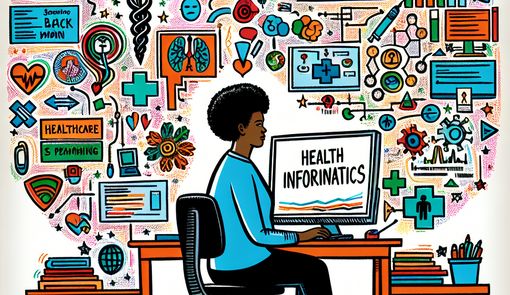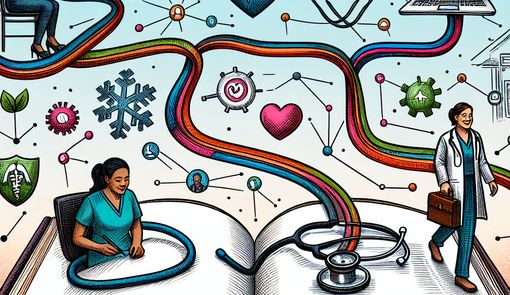Navigating the Job Market as a Health Informatics Specialist

The field of health informatics is a dynamic and growing sector that sits at the intersection of healthcare and information technology. Health informatics specialists are key players in the modern healthcare environment, responsible for the organization, analysis, and management of health information to improve patient care, enhance accessibility, and streamline operations. As this field expands, professionals within it face unique challenges and opportunities in the job market. Navigating the employment landscape effectively as a health informatics specialist requires a multifaceted approach, involving continuous learning, networking, and strategic career planning.
Understanding the Field of Health Informatics
Before diving into the job market, it's crucial to have a firm understanding of the field of health informatics. Health informatics involves the intelligent use of information and technology to provide better health care. It encompasses a variety of roles, from data analysts and IT professionals to clinical informatics specialists and project managers. Each role contributes to the management and analysis of health data, with the ultimate goal of improving patient outcomes.
Education and Certification
A strong educational foundation is vital for anyone looking to succeed in health informatics. A bachelor's degree in health informatics, healthcare administration, or a related field is typically the minimum requirement for entry-level positions. However, pursuing a master's degree or specialized certifications, such as the Certified Health Informatics Systems Professional (CHISP) or the Registered Health Information Administrator (RHIA), can provide a significant competitive edge in the job market.
Continuing education is equally important. The healthcare sector is ever-evolving, and staying abreast of industry changes, new regulations like the HIPAA rules, and emerging technologies such as artificial intelligence and machine learning, is essential for career advancement.
Building a Strong Network
Networking is a powerful tool that can unlock doors to numerous opportunities. Building a professional network within the health informatics field can provide insights into industry trends, advice from seasoned professionals, and access to job openings that may not be advertised publicly. Attending industry conferences, joining professional organizations, and participating in online forums are effective ways to expand your network.
Skills Development
To excel in health informatics, you must possess a blend of technical and soft skills. Technical skills, such as proficiency in electronic health records (EHR) systems, understanding of data storage and retrieval processes, and the ability to analyze complex data sets, are fundamental. Equally crucial are soft skills like problem-solving, communications, and project management. Health informatics specialists must be able to work effectively in collaborative, interdisciplinary teams and communicate complex information in an understandable way.
Tailoring Your Resume and Cover Letter
When applying for jobs, your resume and cover letter should reflect your expertise in health informatics. Highlight specific projects or achievements that demonstrate your skills and impact on healthcare. Tailor your application to each job description, focusing on how your experience aligns with the position's requirements. Keywords are essential, as many organizations use applicant tracking systems (ATS) to screen candidates.
Online Presence and Personal Brand
Maintaining a strong online presence through professional platforms like LinkedIn can be invaluable. A detailed LinkedIn profile that showcases your experience, education, and professional accomplishments can attract the attention of recruiters. Engaging with content related to health informatics, sharing your work, and contributing to discussions can help establish your personal brand as a thought leader in the field.
Interview Preparation
Once you land an interview, thorough preparation is key. Be ready to discuss your experience, relevant skills, and how you can contribute to the potential employer's goals. Practice responding to common interview questions and be prepared to provide examples that illustrate your problem-solving and analytical skills. Understanding the organization's mission and current projects will also help you make a strong impression.
Staying Up-to-Date with Job Listings
Keeping an eye on job listings on dedicated healthcare job boards, as well as general platforms like Indeed and LinkedIn, is important to catch new opportunities. Setting up alerts for health informatics roles can ensure that you don't miss out on potential job postings.
Considering a Range of Employment Options
Health informatics specialists have a diverse range of employment options. You can work in hospitals, clinics, consulting firms, technology companies, or government agencies. Don't limit your search to traditional settings; consider roles in academia, research institutions, or startups that are innovating in the health informatics space.
Conclusion
Navigating the job market as a health informatics specialist requires a combination of targeted education, skills development, and networking. By understanding the unique aspects of the field, tailoring your job search strategies, and staying informed about industry developments, health informatics professionals can find rewarding careers that have a meaningful impact on healthcare delivery. The constant evolution of health informatics offers a challenging yet rewarding career path for those willing to invest the time and effort into their professional development.
Frequently Asked Questions
- What is the role of a health informatics specialist?
A health informatics specialist plays a crucial role in managing health information using technology to improve patient care, streamline operations, and enhance accessibility to healthcare services. They utilize data analysis and information technology to ensure the efficient storage, retrieval, and analysis of health data.
- What educational background is required to become a health informatics specialist?
Typically, a bachelor's degree in health informatics, healthcare administration, or a related field is the minimum requirement for entry-level positions in health informatics. However, pursuing a master's degree or specialized certifications like CHISP or RHIA can enhance job prospects.
- How important is networking for health informatics professionals?
Networking is paramount for health informatics professionals to stay updated on industry trends, access job opportunities, and seek guidance from experienced individuals. Building a strong professional network through conferences, organizations, and online forums can open doors to new career paths.
- What are the essential skills for a successful career in health informatics?
Successful health informatics specialists possess a combination of technical skills, such as proficiency in EHR systems and data analysis, and soft skills like problem-solving and communication. The ability to work in collaborative teams and adapt to new technologies is also critical.
- How can I make my application stand out when applying for health informatics positions?
Tailoring your resume and cover letter to highlight relevant experience and skills is crucial. Emphasize specific projects that showcase your impact in healthcare and align with the job requirements. Use keywords and customize applications for each position.
- What is the significance of maintaining an online presence in the field of health informatics?
Maintaining a professional online presence, especially on platforms like LinkedIn, can enhance visibility to recruiters and potential employers. A well-crafted LinkedIn profile showcasing your achievements and engaging with health informatics content can establish your personal brand in the field.
- How should I prepare for interviews in the health informatics sector?
Interview preparation is essential in the health informatics sector. Be prepared to discuss your experience, skills, and how you can contribute to the organization. Practice common interview questions, provide relevant examples, and research the company's mission and projects.
- Where can I find job listings for health informatics positions?
Job listings for health informatics positions can be found on dedicated healthcare job boards, as well as popular platforms like Indeed and LinkedIn. Setting up alerts for relevant roles ensures you stay updated on new job opportunities.
- What are the employment options available for health informatics specialists?
Health informatics specialists have a wide range of employment options, including hospitals, clinics, technology firms, consulting companies, and government agencies. Exploring roles in academia, research institutions, or startups can provide diverse career opportunities.
- How can health informatics professionals stay updated on industry developments?
Staying informed about industry changes, new technologies, and regulations is crucial for health informatics professionals. Engaging in continuous learning, attending conferences, and networking with peers can help professionals stay abreast of the latest trends in the field.
Further Resources
For additional resources and further exploration of the field of health informatics, the following links can be beneficial:
- Health Informatics Certification Programs: Explore various certification programs that can enhance your qualifications in health informatics.
- American Medical Informatics Association (AMIA): Join the AMIA to connect with professionals in the field, access resources, and stay updated on industry trends.
- HealthIT.gov: Visit this website for valuable information on health information technology, regulations, and initiatives.
- Health Informatics Journal: Access the latest research articles and insights in health informatics through this journal.
- Healthcare Information and Management Systems Society (HIMSS): Attend HIMSS events and explore their resources to stay informed about healthcare technology and informatics.
- Health Informatics Forum: Join this online platform to engage with other health informatics professionals, share knowledge, and discuss industry topics.
- LinkedIn Learning - Health Informatics Courses: Enroll in relevant courses on LinkedIn Learning to expand your knowledge and skills in health informatics.
Explore these resources to deepen your understanding of health informatics, enhance your professional network, and pave the way for a successful career in this dynamic field.






